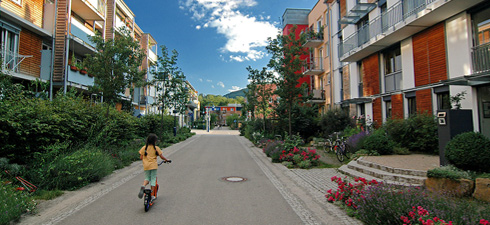Near Freiburg, flower beds replace cars that would normally be parked outside neat, middle-class homes. Instead of the roar of traffic, residents listen to birdsong. The Germans gave the world Audi and the autobahn, writes Paterson, but in Vauban “they have banished everything with four wheels and an engine.” This is only the start of what is hailed as one of Europe's most successful experiments in green living.
Home to 5,300 people, all of Vauban’s elegant apartment blocks have triple-glazing. Most are powered by solar panels and smart generators provide heating and electricity. Waste from biological toilets is reduced to compost, while shower and washing-up water is filtered and used for gardening. At the entrance to this reconverted army camp that once housed Hitler’s army, visitors are greeted by a slogan that reads: "We are creating the world we want.”
But is Vauban a paradise? The suburb’s eminently middle class homes remind Paterson of a never-ending IKEA ad. “Sitting outside a former Nazi building that now functions as an organic restaurant selling ricotta-filled ravioli and ostrich meat, it’s difficult to spot anyone who is non-European, old or poor,” he notes. Vauban’s most dominant note, it seems, is one of “middle-class monoculturalism.”
Do you like our work?
Help multilingual European journalism to thrive, without ads or paywalls. Your one-off or regular support will keep our newsroom independent. Thank you!












